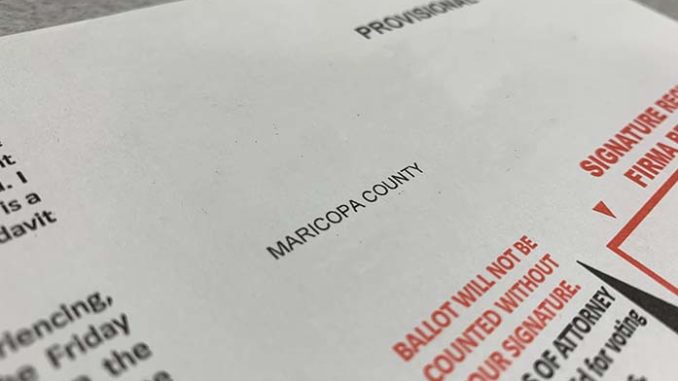
The Arizona Supreme Court has ordered Maricopa County to pay nearly $60,000 to a Phoenix law firm after losing a lawsuit about County Recorder Adrian Fontes’ decision to provide voters an unapproved instruction for fixing errors on their ballots.
The supreme court’s award of $58,949 to Kolodin Law Group for attorney’s fees and court costs stems from a Sept. 10 ruling that found Fontes and other county officials “exceeded their authority” by advising voters to simply “cross out” any incorrect vote and then fill in the correct oval. The state’s approved procedure for resolving such mistakes is to request a new ballot so only the correct votes are marked.
Kolodin Law Group is also representing two Maricopa County voters who filed an election challenge on Thursday against Fontes and the county’s board of supervisors over problems encountered while trying to vote in-person on Nov. 3.
One of the plaintiffs, Laura Aguilera, contends she received a ballot after checking in on election day at one of Maricopa County’s 175 voting centers. However, she claims the tabulation machine provided no confirmation that her ballot was accepted.
When a ballot is processed correctly the tabulation machine prompts the voter to press a green button, which formally submits the ballot for counting. Any problems with the ballot should cause the machine to alert both the voter and a poll worker that further review is needed.
The lawsuit alleges Aguilera was denied a new after she reported a problem with the tabulation machine and that a poll worker then cancelled her check-in. The county’s webpage for voter participation does not show Aguilera ever checked-in on Election Day.
The other plaintiff, Donovan Drobina, alleges a tabulation machine at a different voting center was unable to read his ballot despite two attempts. A poll worker purportedly instructed Drobina to put his ballot in a special slot on tabulation machine so it could be manually reviewed later.
This caused Drobina to leave the voting site without his ballot already being tabulated. Such ballots are sent off-site where they are run through a different tabulation machine. If the ballot still can’t be read it is subjected to manual review by elections officials.
According to the lawsuit, Drobina was not “afforded the opportunity to cast a replacement ballot that would have allowed his votes to be automatically read and tabulated on site.” It adds that “voters have a right to know with certainty that, when they follow the instructions of elections officials, their votes will be counted both automatically and perfectly.”
Although the plaintiffs do not allege intentional misconduct by elections officials and employees, the lawsuit seeks “to vindicate their rights as Arizona voters to cast a vote that is not only counted, but is counted according to the processes the law requires, in both this and future elections.”
To that end, Aguilera is seeking a court order allowing her to cast a new ballot by Nov. 30, the date Secretary of State Katie Hobbs canvasses and certifies the election results for state and federal offices.
The parties have been ordered to appear for a telephonic hearing on Monday, Nov. 16 with Judge James D. Smith of the Maricopa County Superior Court.
The Arizona Supreme Court’s ruling in September against Fontes was obtained by Kolodin Law Group on behalf of Arizona Public Integrity Alliance. It enjoined county officials from distributing the “cross-out and re-vote” instruction with early ballots, but that didn’t stop those same county officials from including the prohibited instruction with election pamphlets later mailed to thousands of Maricopa County voters.
The county’s disregard for the spirit of the supreme court ruling is one reason the justices could award even more money to the Kolodin attorneys once a pending contempt motion is decided by the court. That’s because the law firm filed a contempt motion on Oct. 29, alleging that Fontes and other county officials acted in violation of the supreme court’s order by including the instruction with the pamphlets.
The contempt motion also cited Fontes’ highly critical public comments about the justices’ ruling. The justices are expected to hear arguments on the contempt issue later this year.

